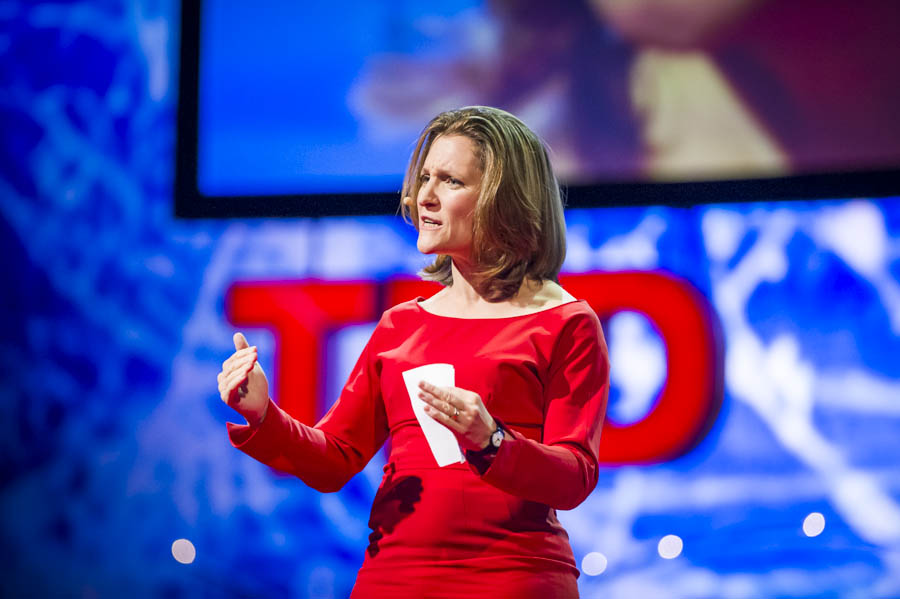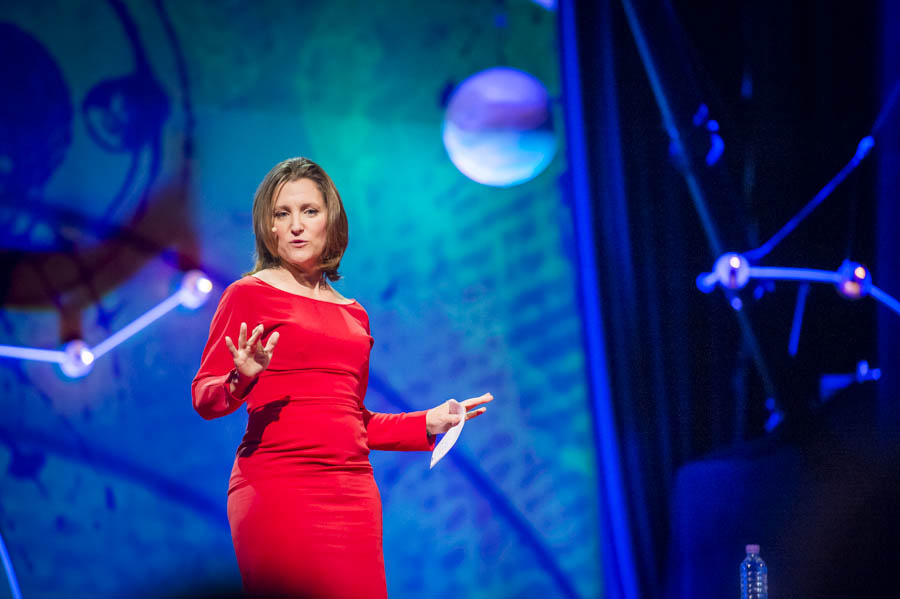The most important economic fact of our time, says Chrystia Freeland, author of Plutocrats, is that we are living in an age of surging income inequality, a global phenomenon that includes the US and UK, certainly, but also Communist China, India, and, she says, “we’re even seeing it cozy social democracies like Sweden, Finland and Germany.”
She offers some numbers to demonstrate how profound this shift has been. In the US in the 1970s, the top 1% accounted for 10% of national income. Today, that share has more than doubled. Even more strikingly, the top 0.1% today accounts for more than 8% of natonal income. Money isn’t being evenly distributed, and the problem is getting worse. Or to take another perspective, the combined incomes of Bill Gates and Warren Buffet equals the wealth of the bottom 40% of the nation. Meanwhile, middle-class incomes have stagnated or decreased.
These are pretty dramatic figures. So how’d this happen without our noticing? Freeland says it’s partly a boiled frog effect — we don’t notice when things creep up on us gradually. But talking about income inequality is also uncomfortable. We’d much rather frame it in terms of how to make the pie bigger than face the painful truth about how it’s divided — a conversation that’s especially threatening for those at the top.
So what’s driving this profound shift in income inequality, and what can be done? Freeland points to political forces — lower taxes, deregulation, privatization, weaker protection for unions — that allow money to move up to the top. She calls this combination of factors “crony capitalism,” a set of political changes that benefit insiders but don’t do much good for the rest of us. No one argues in favour of crony capitalism in principle — not the left or the right, and not even the plutocrats themselves. But it’s notoriously hard to uproot; consider how hard it has been to regulate banks in the wake of the financial crisis, or to get corporations to pay their fair share of tax.
Globalization and technological change are also powerful economic drivers of income inequality. These days, any entrepreneur can easily access more than a billion customers. The result: “If you’re very very smart and very very lucky, you can get very very rich very very quickly.” The latest poster child: 26-year-old David Karp of Tumblr, when Yahoo bought his company for $1.1 billion. But the riches aren’t limited to superstars of tech. Globalization and technology now present us with superstar bankers, lawyers, architects, cooks, farmers, even superstar dentists like Bernard Touati.
What’s hard is figuring out how to think about plutocracy, because on the face of it, so much of what globalization and technology have done is positive. It has made many of our goods and services much more affordable, and it has lifted millions out of poverty into the middle class. But as we enjoy these benefits (“Who do you think built your iPhone?” she asks), maybe we are turning a blind eye to how meritocratic plutocracy is becoming crony plutocracy. It can be tempting for those at the top to manipulate the political global economy for their own gain. Take beloved companies Amazon, Apple, Google and Starbucks — admired and innovative companies who are, on the other hand, quite adept at working the international tax system to lower their tax bills. More worryingly, she says, it becomes tempting to start trying to change the rules of the game in your own favor. This is what happened with the deregulation of financial services in the US and UK, for example.
And the plutocracy is also in danger of becoming an aristocracy, with what she calls the “alphageeks” spending unprecedented time and resources on the education of their children in an “educational arms race” that ends at the Ivy leagues. Middle-class parents are simply outgunned. “Plutocracy may be a meritocracy,” she says, “but increasingly you have to be born at the top of the ladder to take part in that.”
Meanwhile these same forces are hollowing out the middle class in Western economies, devouring jobs. (“When was the last time you used a travel agent?” she asks.) And not many new jobs are being created to take their place. Where GM once employed hundreds of thousands, Facebook employs only 10,000. Other jobs are being outsourced to emerging markets. Fact is, says Freeland, “there’s no economic rule that translates economic growth into widely shared prosperity.” In a free market, everyone who wants work should be able to find it. But her dystopian nightmare is “a universe in which a few geniuses invent Google, and the rest of us are employed giving them massages.”
Hopefully, that won’t happen. Freeland comforts herself by remembering the Industrial Revolution, which gave us greater wealth and longevity than our 19th-century ancestors. But, she points out, before we were able to figure out how that revolution could benefit the many, humanity had to go through two Communist revolutions, two world wars, two deep depressions and a period of social and political upheaval — as well as a period of social and political invention, which produced the modern welfare state, healthcare and more. Freeland believes we are experiencing a similarly transformational time now. “We are living through an era of economic evolution comparable in scale to the Industrial Revolution,” she says. To make the the new economy work for everyone, not just the plutocrats, she says, “We need a new New Deal.”
Chrystia Freeland’s talk is now available for viewing. Watch it on TED.com »


Comments (12)
Pingback: Your mega summer reading list: 200 books recommended by TEDsters | Inteligência Competitiva por Alfredo Passos
Pingback: Oligarchy: A Rite Of Passage? | Pragmatic Witness
Pingback: A Visionary Fish in a Pool of Sharks | Original Nerdster
Pingback: El lujo más inalcanzable - Forbes México
Pingback: TED News in Brief: Chrystia Freeland runs for office, Matt Damon tells a TED-related story | Best Science News
Pingback: TED News in Brief: Chrystia Freeland runs for office, Matt Damon tells a TED-related story | BizBox B2B Social Site
Pingback: TED News in Brief: Chrystia Freeland runs for office, Matt Damon tells a TED-related story | Krantenkoppen Tech
Pingback: TEDGlobal – Inspiration overload! ‹ Alfa Bravo
Pingback: Christia Freland | elcidharth
Pingback: Sometimes it’s just in the air | Desiderium Sciendi